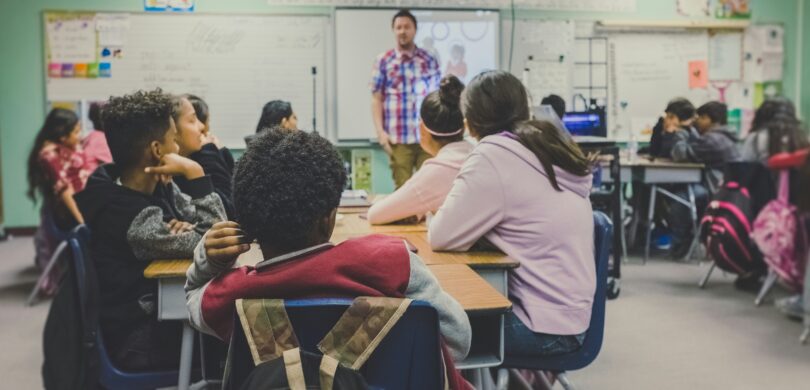Education is always a central focus for state legislators. Debates over teacher pay and school funding have dominated statehouses for decades. In recent years, education policy debates in the states has shifted away from funding. Now, legislators are focusing on battles over curricula, staffing, and school environments.
At Plural, we’ve followed these issues closely. We’ve covered legislation impacting race and education and legislation impacting transgender and nonbinary kids in school. We know that the results of this policy shift have been profound. The NAACP has issued a travel advisory for the state of Florida and advised black student-athletes against enrolling in the state. Across the country, book bans and challenges have surged, and school board meetings have become increasingly combative.
The most recent policy proposal to emerge from this trend has involved authorizing school districts to bring chaplains into schools. Texas Senate Bill 763, which became law in June of 2023, is one example of such efforts. The new law allows Texas public school districts to employ or otherwise allow volunteer chaplains to provide services in schools.
The law has faced strong opposition, including from chaplains themselves. Despite this, it has sparked efforts in other states to incorporate chaplains into public school resources. Utah, Alabama, Nebraska, and Georgia are among the states to have considered similar proposals. Florida’s legislature just passed its “school chaplain” bill onto Governor DeSantis’ desk.
What Would Florida’s School Chaplain Bill Do?
Florida’s legislature passed HB 931 on March 7, 2024. Governor DeSantis will soon decide whether to sign the bill into law, veto it, or allow it to become law without his signature. HB 931 closely mirrors the Texas law, as well as many of the bills being considered elsewhere. It would allow school districts to adopt policies authorizing volunteer chaplains to provide support, services, and programs in public schools.
Under HB 931, the districts’ policies must clearly define the chaplain’s role. Parents must be informed of and consent to any services provided by chaplains. Like other school employees, volunteer chaplains will be required to pass background checks.
Summarizing Florida HB 931 With Plural’s AI-Powered Bill Summarizer
Plural’s AI-powered bill summarizer generated the following summary of Florida HB 931. Plural distilled hundreds of words into the following summary:
The bill is proposing to allow school districts and charter schools to adopt a policy authorizing volunteer school chaplains. If adopted, the policy must:
1) Describe the supports, services, and programs the chaplains may provide.
2) Require schools to inform parents about the availability of chaplains.
3) Require written parental consent for students to participate in chaplain services. Parents can select chaplains from a list that includes religious affiliation.
The bill also requires chaplains to meet background screening requirements. School boards and charter schools must vote by January 1, 2025 on whether to adopt such a policy. Districts that adopt the policy must publish a list of chaplains on their website.
The bill is amending existing law to subject chaplains to the same background screening as other noninstructional personnel.
In summary, the bill proposes allowing volunteer school chaplains and establishes requirements around policy adoption, parental consent, and background screening.
Analyzing Florida HB 931’s Version-to-Version Summary
The final version of the bill contains notable differences from the introduced version of Florida HB 931. Plural’s AI-powered version-to-version summarizer provides the following overview:
Differences in Proposed Changes: 1) The previous version requires a vote by January 1, 2025, on adopting a chaplain policy, which is not mentioned in the new version. 2) The previous version specifies that only school districts must publish the list of chaplains, while the new version requires both school districts and charter schools to publish the list.
Plural’s AI-generated summary highlights a few notable differences. The filed version of the bill excludes the requirement for a vote on the chaplain policy. This is particularly notable, since Texas legislators included a similar provision in their law. With this exclusion, Florida legislators may be attempting to avoid political backlash — many of Texas’ largest school districts recently rejected chaplain programs.
How are Education Advocates Reacting to School Chaplain Proposals?
Proponents of these efforts include conservative and religious groups. Education policy issues of this nature tend to fall along predictable partisan divides. However, it’s notable that five House Democrats in Florida voted in support of HB 931.
Advocates for these measures include the National School Chaplain Association, a Christian ministry aiming to serve spiritual needs in schools. Supporters argue that chaplains can play a role in meeting growing mental health needs and improving school safety.
Opponents include the American Civil Liberties Union (ACLU) and many chaplains themselves. They raise the uncertain constitutionality of these issues, questioning whether they violate separation of church and state. Many opponents have also noted that chaplains are already eligible to volunteer in schools, but counseling and behavioral health support should be left to trained professionals.

Where do School Chaplain Bills Go From Here?
More than a dozen states have considered school chaplain proposals. These efforts have stalled in most states. In Utah, state senators narrowly rejected a school chaplain bill prior to the end of their 2024 legislative session.
In states that do pass bills, it will take some time before new policies take effect. When they do, proponents and opponents alike will certainly be watching their impact. It’s likely that more school chaplain bills to be taken up in 2025. Legislators will look to the experiences of early adopters to formulate their arguments.
In an unexpected twist for advocates of school chaplain bills, the Satanic Temple has voiced its support. The Satanic Temple does not actually worship Satan, but rather advocates for first amendment rights and religious freedoms. The organization has indicated its interest in participating in school chaplain programs in Florida, Iowa, and Utah.
It’s not hard to imagine how school chaplain policies could quickly lead to litigation and controversy. At Plural, we’re committed to monitoring the newsworthy issues that impact Americans. Stay tuned for more!
Get Started With Plural
Plural is the legislative tracking tool of choice for policy teams monitoring issues related to education. With Plural, you’ll:
- Access superior public policy data
- Be the first to know about new bills and changes in bill status
- Streamline your day with seamless organization features
- Harness the power of time-saving AI tools to gain insights into individual bills and the entire legislative landscape
- Keep everyone on the same page with internal collaboration and external reporting all in one place
Interested in learning more? Create a free account or book a demo today!



